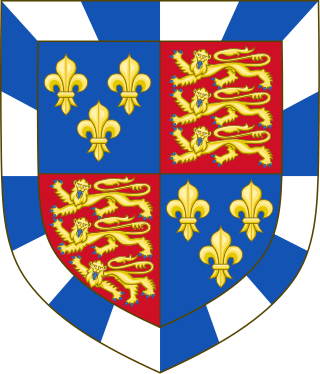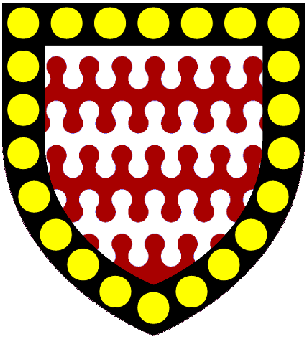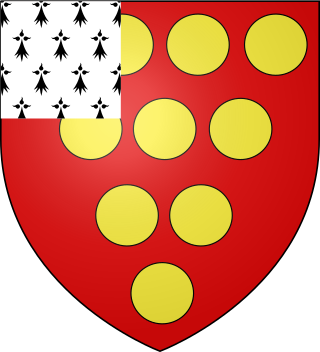Related Research Articles

Henry Beaufort, 3rd Duke of Somerset was an important Lancastrian military commander during the English Wars of the Roses. He is sometimes numbered the 2nd Duke of Somerset, because the title was re-created for his father after his uncle died. He also held the subsidiary titles of 5th Earl of Somerset, 2nd Marquess of Dorset and 2nd Earl of Dorset.

Roger Mortimer, 3rd Baron Mortimer of Wigmore, 1st Earl of March, was an English nobleman and powerful Marcher Lord who gained many estates in the Welsh Marches and Ireland following his advantageous marriage to the wealthy heiress Joan de Geneville, 2nd Baroness Geneville. Her mother was of the Royal House of Lusignan.

Sir William de Shareshull KB (1289/1290–1370) was an English lawyer and Chief Justice of the King's Bench from 26 October 1350 to 5 July 1361. He achieved prominence under the administration of Edward III of England.

Sir John Knyvet was an English lawyer and administrator. He was Chief Justice of the King's Bench from 1365 to 1372, and Lord Chancellor of England from 1372 to 1377.
Sir David II Strathbogie was Earl of Atholl, Constable of Scotland, and Chief Warden of Northumberland.
Simon of Pattishall was an English judge and civil servant who is considered the first Chief Justice of the Common Pleas.
Loders Priory was a priory in Loders, Dorset, England.
Sir Guy Fairfax, was an English judge.
Samuel Browne, of Arlesey, Bedfordshire, was Member of Parliament during the English Civil War and the First Commonwealth who supported the Parliamentary cause. However he refused to support the trial and execution of Charles I and, along with five of his colleagues, resigned his seat on the bench. At the Restoration of 1660 this was noted and he was made a judge of the Common Pleas.
Richard de Ferings, was the Archbishop of Dublin.

Robert Walerand, was Justiciar to King Henry III (1216–1272). He was throughout his reign one of the king's familiares. Among the king's household knights he stands in the same position as his friend John Mansel among the royal clerks. Walerand was most notably employed by the king in the ill-fated scheme of raising money from the barons for his second son Edmund to take up the crown of Sicily, offered by the Pope in 1254. His forceful exactions in that connection were one of the causes of the rebellion of Simon de Montfort and the Barons' War, which ended however with royal victory at the Battle of Evesham in 1265. His principal residence was Siston, Gloucestershire.
Roger de Beaufeu or Bello Fago, judge, was probably of the same family as Nicholas de Beaufo of Beaufo's Manor, Norfolk, a contemporary of the judge.
Ellis Beckingham, named Ellis of Beckingham in some sources, was a parish priest for Warmington, Northamptonshire, which at the time was under the authority of Peterborough Abbey, and with which Beckingham had a close relationship throughout his life. He both assisted the Abbey legally and increased his wealth through their grants. He was also a royal judge, and is possibly best known for being the only English judge to keep his position when most of his colleagues were dismissed. As a result, he has been called "with one exception the only honest judge" of the time. The dates of his birth and death are unknown, but he is thought to have died in around 1307.
William Haute (1390–1462) of Bishopsbourne, Kent, was an English politician.
William de Skipwith was a fourteenth-century English judge, who also served as a judge in Ireland. He held the office of Chief Baron of the Exchequer 1362-5. He suffered temporary disgrace when he was removed from office for corruption, but he was restored to favour, became Lord Chief Justice of Ireland 1370-2, and later returned to the English bench. He appears to have been the only High Court judge to have escaped impeachment by the English Parliament of 1388.

Sir William de Notton, or Norton was an English landowner and judge, who had a highly successful career in both England and Ireland, culminating in his appointment as Lord Chief Justice of Ireland in 1361.
Thomas Yonge or Young was an English politician and judge.
Sir John Marmion, Baron Marmion of Winteringham was an Anglo-Norman baron who represented Lincolnshire in Parliament and fought in the Wars of Scottish Independence.

William la Zouche, 1st Baron Zouche (1276/86–1352), lord of the manor of Harringworth in Northamptonshire, was an English baron and soldier who fought in the Wars of Scottish Independence. He is referred to in history as "of Harringworth" to distinguish him from his first cousin Alan la Zouche, 1st Baron la Zouche (1267–1314) of Ashby de la Zouch in Leicestershire.

Sir William de Windsor, Baron Windsor was an English administrator who served as King's Lieutenant in Ireland.
References
- Attribution
![]() This article incorporates text from a publication now in the public domain : "Holt, John (d.1418)". Dictionary of National Biography . London: Smith, Elder & Co. 1885–1900.
This article incorporates text from a publication now in the public domain : "Holt, John (d.1418)". Dictionary of National Biography . London: Smith, Elder & Co. 1885–1900.